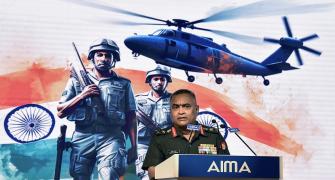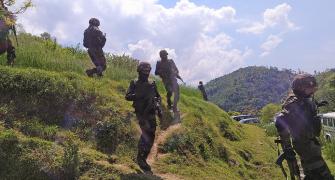Amman: Everyone in the Jordanian capital takes it for granted that I am a journalist. How do they know? Because everybody else, even diplomats, is making a beeline out of the Middle East before the shooting starts.
So, when is the war due to start? Jordanians are sure it will ignite as soon as 'The Resort' is complete. Thinking this to be a code-word of some sort, I ask for a clarification. It turns out that 'The Resort' is just what the name suggests, 150 luxurious villas on a hundred sprawling acres of land somewhere in the north of Iraq, about 70 kilometres from the Syrian border. Owned by a Kurd, the capital is apparently coming from the United States. Jordanians are convinced this has been earmarked as the operational headquarters for this part of the world by American and British officers. As soon as the last inch of optic-fibre cable is laid and the last satellite dish tilted just so, the invaders shall arrive to take possession.
Jordan seems to be resigned to the inevitability of war. They are most worried about the fallout on their own kingdom. Most of Jordan's petroleum comes courtesy Iraq, and they have wangled a special deal -- a whopping 50 per cent -- 75 per cent below the market rate. The United States has promised to find a replacement, but oil supplies are low everywhere thanks to an unusually cold winter in the northern hemisphere and civil unrest in distant Venezuela.
I found it interesting that everyone in Amman speaks of an American 'invasion;' the United States evidently has its work cut out for it if it seeks to convince the Arab street that it is coming to 'liberate' Iraq. Everyone is convinced it is Iraq's oil that is drawing the world's greatest military power to the sands of Mesopotamia.
One gentleman offers an innovative twist on the same theme. It is, he insists, actually about money and teaching 'old Europe' a lesson. The dollar is the world's de facto currency, and Washington would like to keep it that way. But of late there is a challenger, the Euro. In the wake of September 11, Arab money, collectively worth US $200 billion, has shifted across the Atlantic. Consequently, the Euro, once trading well below the dollar, is now being quoted slightly above it. Saddam Hussein, this theory goes, signed his death warrant when he began insisting that Iraq would accept payment only in Euros, rather than in dollars as of old.
Suspicion about American motives does not translate into any great love of France, Germany, or Russia. France, as the Arabs point out, has a vested interest in keeping the current regime in power. According to Iraqi dissidents, Iraq approached the French in 1974 to purchase a nuclear reactor. It should have cost $50 million, but Baghdad ended up shelling out $200 million. The Habbaniya Resort project cost $750 million, and France made the same kind of profit on that too. And French companies are also up to their neck in oil deals.
In fact, Iraq's two largest trading partners in the world are France and Russia. Guess which permanent members of the Security Council threatened to veto any resolution aimed at bringing down the government of Saddam Hussein?
Coupled with the cynicism are frustration and anger. Jordanians seethe because a neighbour's fate is being debated in New York, Washington, London, Paris, and Moscow, with the Arab voice going almost unheard. (Syria is the only Arab nation in the Security Council.)
Oddly, the issues raised by the home-grown Left in India are accepted as a matter of course. Some Indians are still questioning whether Saddam Hussein has access to weapons of mass destruction. In Jordan, this is taken for granted. Of course, the Iraqi leader himself has accepted that he did possess them at one stage, but claims they have since been destroyed.
This, of course, is the problem. The United Nations inspectors weren't supposed to travel around looking for arms violations, they were only asked to check declarations made by Iraq itself. But if Iraq refuses to cooperate, what option is there but war?
The bottomline is that every nation is looking to its own interests. The Jordanians worry about rising oil bills. The United States and Britain are concerned about their own security. France and Russia are protecting their commercial interests. When will Indian foreign policy makers learn to be equally cold-blooded?








